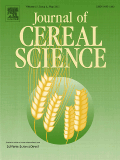
Journal of Cereal Science
Scope & Guideline
Cultivating knowledge in biochemistry and food science.
Introduction
Aims and Scopes
- Grain Quality and Processing:
Research in this area emphasizes the physicochemical properties of various cereal grains, assessing how different processing techniques affect their quality, texture, and nutritional value. - Nutritional and Health Benefits:
The journal explores the health benefits associated with cereal consumption, including the impact of bioactive compounds and dietary fibers on health outcomes. - Innovative Processing Techniques:
A consistent focus on novel processing methods, such as ultrasonication, microwave treatment, and fermentation, which enhance the functional properties of cereal products. - Genetic and Agronomic Studies:
Investigations into genetic factors affecting grain quality, yield, and resistance to environmental stresses, contributing to breeding programs aimed at improving cereal crops. - Sustainable Practices in Cereal Production:
Research that addresses sustainability in cereal agriculture, including the effects of fertilization and cultivation practices on grain quality and environmental impact.
Trending and Emerging
- Functional Foods and Nutraceuticals:
There is a notable increase in studies exploring the health benefits of cereal grains, particularly their roles as functional foods rich in bioactive compounds that contribute to disease prevention. - Innovative Ingredients from Cereal By-products:
Research is trending towards utilizing by-products of cereal processing as functional ingredients, enhancing nutritional profiles and sustainability. - Interdisciplinary Approaches:
An emerging trend is the integration of different scientific disciplines, such as genomics, nutrition, and food technology, to address complex challenges in cereal science. - Climate Resilience in Cereal Production:
Research focusing on how climate change impacts cereal quality and yield is gaining momentum, emphasizing the need for resilient agricultural practices. - Sustainable Cereal Production Practices:
There is a growing emphasis on sustainable agricultural practices, including organic farming and integrated pest management, to enhance grain quality and environmental sustainability.
Declining or Waning
- Traditional Grain Processing Methods:
Research focused on conventional grain processing techniques has seen a decrease, as newer methods gain traction and demonstrate more effective results. - Basic Grain Storage Studies:
There has been a waning interest in studies solely focused on the storage of grains without considering the implications for quality and processing. - Single Crop Focus Studies:
Research that concentrates on a single cereal crop is less common, as interdisciplinary approaches that incorporate multiple grains are becoming more favored.
Similar Journals

Applied Food Research
Exploring the Frontiers of Food Safety and NutritionApplied Food Research, published by Elsevier, is an esteemed journal that plays a critical role in advancing the field of Food Science. With an ISSN of 2772-5022, the journal has established itself as a premier outlet for high-quality research, achieving a commendable Q1 ranking in the 2023 Food Science category and a 63rd percentile in Scopus rankings for Agricultural and Biological Sciences. Covering a diverse range of topics from food safety to innovative processing techniques, Applied Food Research seeks to publish pioneering studies that enhance our understanding of food systems and contribute to broader discussions on sustainability and nutrition. As it converges on its fourth year of publication, researchers, professionals, and students alike are encouraged to engage with its content through various open access options, ensuring widespread dissemination of knowledge in a field that is vital to global health and well-being. Operating out of Amsterdam, Netherlands, this journal is poised to be an indispensable resource for anyone dedicated to making significant contributions in the domain of food science.
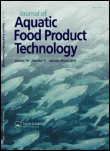
Journal of Aquatic Food Product Technology
Advancing aquatic innovation for a sustainable future.Journal of Aquatic Food Product Technology is a vital publication dedicated to advancing research and innovation in the fields of aquatic science and food technology. Established in 1992 and published by TAYLOR & FRANCIS INC, this journal provides an exceptional platform for researchers, professionals, and students to share their findings and insights on the science and technology surrounding aquatic food products. With an ISSN of 1049-8850 and an E-ISSN of 1547-0636, the journal caters to a global audience, contributing to significant advancements in both the agricultural and biological sciences. As of 2023, it holds a prestigious position in the Q3 quartile for both Aquatic Science and Food Science categories, reflecting its role in the scientific community. Furthermore, with Scopus rankings placing it at #106 out of 247 in its field, this journal is an essential resource for those dedicated to understanding and innovating in the domain of aquatic food products. Although not an open access journal, it ensures that the important research it publishes is accessible to a wide audience interested in improving food safety, sustainability, and nutrition from aquatic sources.

Foods
Empowering Ideas in Food Science and Microbiology.Foods is a premier open access journal published by MDPI, based in Switzerland, that has been at the forefront of disseminating high-quality research in the fields of food science, health professions, and plant science since its establishment in 2012. With an impressive convergence of interdisciplinary studies spanning various aspects of food, nutrition, and microbiology, the journal aims to provide a comprehensive platform for researchers and professionals to share innovative ideas and findings. Maintained as a Q1 journal in multiple categories for 2023, including Food Science and Health Professions, Foods has garnered significant recognition within the academic community, reflected in its strong Scopus rankings and percentiles across various disciplines. The journal not only promotes open access to enhance the visibility and accessibility of research but also encourages the exploration of sustainable food systems and health-related issues, thus contributing to essential discussions in today's society. For those looking to advance their understanding and expertise in food-related sciences, Foods serves as an enduring resource for groundbreaking studies and critical insights.
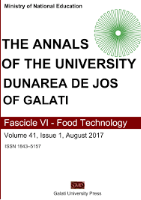
Annals of the University Dunarea de Jos of Galati, Fascicle VI-Food Technology
Advancing Food Innovation and SafetyAnnals of the University Dunarea de Jos of Galati, Fascicle VI-Food Technology is a distinguished academic journal published by GALATI UNIV PRESS, dedicated to advancing knowledge in the field of food technology. With an open access format since 2007, this journal enhances accessibility to research findings and facilitates the dissemination of innovative ideas among researchers, professionals, and students worldwide. The journal holds a noteworthy position in its category, boasting a 2023 Q3 ranking in both Food Science and Industrial and Manufacturing Engineering, indicating its relevance and contribution to these critical fields. As it converges years of publication from 2012 to 2023, it encapsulates an evolving body of knowledge that reflects the latest advancements and research trends. Although it may not yet have a defined HIndex, its presence in Scopus with ranks of #253 in Industrial and Manufacturing Engineering and #278 in Food Science underscores its emerging impact. This journal is particularly significant for those engaged in research related to food technology and engineering, facilitating dialogue and collaboration within the community while addressing pressing challenges and innovations in food processing and safety. With its commitment to quality research, Annals of the University Dunarea de Jos of Galati serves as an essential resource for fostering knowledge and promoting scientific discussion.
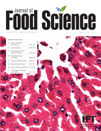
JOURNAL OF FOOD SCIENCE
Exploring the Science Behind Every BiteJOURNAL OF FOOD SCIENCE, published by Wiley, is a premier journal dedicated to advancing the field of food science, bridging the gap between fundamental research and practical application. With an impressive impact factor reflecting its authoritative status, the journal is ranked in the Q1 quartile for Food Science in 2023 and boasts a Scopus ranking of #71 out of 389, placing it in the 81st percentile within Agricultural and Biological Sciences. First launched in 1936, the journal continues to serve as an essential platform for researchers, professionals, and students to disseminate innovative studies and reviews that address critical issues in food quality, safety, and technology. While not currently offering open access, its rigorous peer-review process ensures the dissemination of high-quality and impactful research. Researchers engaged in the vital disciplines of food science will find this journal indispensable for keeping abreast of cutting-edge developments in the field.

JOURNAL OF FOOD SCIENCE AND TECHNOLOGY-MYSORE
Unlocking the Science Behind Food TechnologyJOURNAL OF FOOD SCIENCE AND TECHNOLOGY-MYSORE, published by SPRINGER INDIA, is a distinguished peer-reviewed journal that has been contributing to the ever-evolving field of food science since its inception in 1974. With an ISSN of 0022-1155 and E-ISSN 0975-8402, this journal holds a commendable position in the Q2 category for Food Science, as per the 2023 metrics, and ranks #58 out of 389 in Scopus's Agricultural and Biological Sciences sector, achieving an impressive 85th percentile. The journal publishes high-quality research articles, reviews, and case studies that cover a wide array of topics, from food preservation to innovative technologies in food processing. Although it is not an open-access journal, it endeavors to disseminate essential knowledge and research strategies that advance food science and benefit both industry professionals and academia. The geographical reach of the journal, alongside its rigorous editorial standards, solidifies its stature as a pivotal resource for researchers, professionals, and students dedicated to the enhancement of food science practices and technologies.
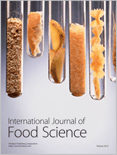
International Journal of Food Science
Delivering Cutting-edge Insights in Food ScienceThe International Journal of Food Science, published by HINDAWI LTD, stands as a crucial platform for advancing knowledge within the realm of food science. Established in 2013, this Open Access journal based in Egypt has garnered significant recognition, achieving an impressive Q2 classification in the 2023 Food Science category, which reflects its commitment to quality and impactful research. With a Scopus rank of #88 out of 389 in Agricultural and Biological Sciences and placing in the 77th percentile, this journal serves as an essential resource for researchers, professionals, and students dedicated to innovative developments and scientific exploration in food science. The journal not only provides unrestricted access to valuable research but also aims to foster collaboration and dissemination of knowledge on critical issues affecting food safety, nutrition, and technology. For those looking to keep abreast of the latest advancements, the International Journal of Food Science is certainly an indispensable addition to their academic pursuits.
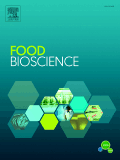
Food Bioscience
Bridging Disciplines to Transform Global Food SystemsFood Bioscience is a leading peer-reviewed journal published by Elsevier, dedicated to advancing the understanding of the complex interplay between food science and biosciences. With an impressive Impact Factor that places it in the Q1 and Q2 quartiles for Food Science and Biochemistry respectively, the journal consistently ranks among the top publications in its field, reflected in its Scopus rankings (Rank #83/389 in Food Science and Rank #175/438 in Biochemistry). Since its inception in 2013, Food Bioscience has fostered a multidisciplinary approach, bridging gaps between research in agricultural, biological, and food sciences, thus encouraging innovative solutions to the pressing challenges facing the global food supply chain. Although it currently operates under a subscription model, the journal is committed to disseminating high-quality research, making significant contributions to both academic scholarship and industry practices. Researchers, professionals, and students alike are invited to explore the wealth of knowledge contained within its pages as it plays a pivotal role in shaping the future of food bioscience.

Food Production Processing and Nutrition
Navigating the future of food processing and nutrition.Food Production Processing and Nutrition, published by SpringerNature, stands at the forefront of advancing knowledge in the vibrant fields of food science, nutrition, and public health. This esteemed Open Access journal, operational since 2019, plays a pivotal role in disseminating breakthrough research that intersects food production processes with nutritional insights, making it an invaluable resource for researchers, professionals, and students alike. With a commendable 2023 impact factor reflecting its robust scholarly contributions — Q1 in Food Science and Q2 in both Nutrition and Dietetics and Public Health, Environmental and Occupational Health — the journal not only emphasizes the importance of innovative food processing methods but also addresses pressing nutritional challenges faced globally. Located in the United Kingdom, it claims an impressive Scopus ranking, with a notable percentile standing across various categorical metrics. As such, Food Production Processing and Nutrition is essential for anyone aiming to deepen their understanding of how food systems impact public health through effective processing and nutritional strategies.

Food Chemistry-X
Diving Deep into the Chemistry of Culinary Creations.Food Chemistry-X is a premier open-access journal published by Elsevier, dedicated to advancing the field of food chemistry through high-quality research and comprehensive reviews. With its ISSN of 2590-1575, the journal has gained significant attention since adopting an open-access model in 2019, allowing wide dissemination of knowledge and innovations in food science. Based in the United Kingdom, it holds prestigious Q1 rankings in both Analytical Chemistry and Food Science categories as of 2023, positioning itself as a leading platform for researchers worldwide. The journal's focus spans extensive topics within food chemistry, including food safety, nutritional analysis, and the chemical properties of food, offering insights that are crucial for addressing contemporary challenges in food production and consumption. With a Scopus rank placing it in the 65th percentile among the top journals in Food Science and the 58th percentile in Analytical Chemistry, Food Chemistry-X is an essential resource for academics, professionals, and students seeking to stay at the forefront of research and innovation in this vibrant field.